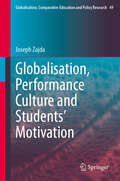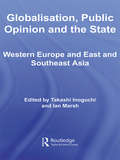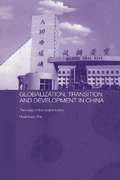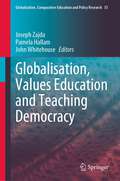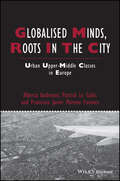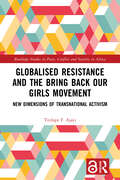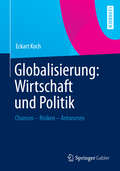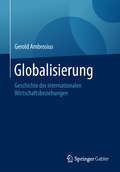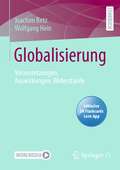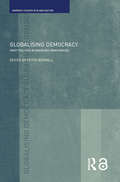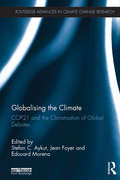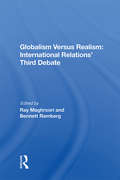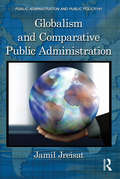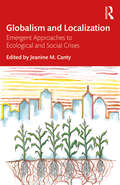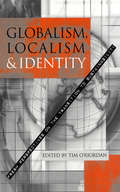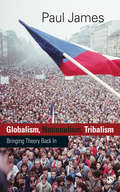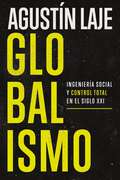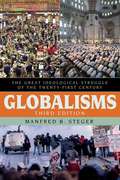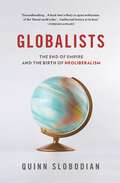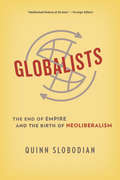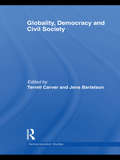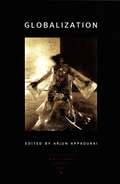- Table View
- List View
Globalisation, Performance Culture and Students’ Motivation (Globalisation, Comparative Education and Policy Research #49)
by Joseph ZajdaThis book analyses education policy trends that affects performing culture, academic excellence and global competitiveness in schools. It focuses on students’ cultural identities and engagement, inclusive schooling, eliminating discrimination and discriminatory practices in the classroom, and relevant values education. One of the major effects of cultural and economic forces of globalisation is that schools and school leaders, like other educational organisations, having modelled their goals and strategies on the entrepreneurial business model. They are compelled to embrace the corporate ethos of efficiency, accountability, performance, and profit-driven managerialism. This corporate ethos reflects a dominant neo-liberal ideology, which exerts a powerful influence on major discourses of democracy, equality, social justice, and education, both locally and globally. By examining the education policy shifts in the use of major discourses concerning performing culture and education, this book offers a comprehensive synthesis of the intersecting and diverse discourses of globalisation, cultural diversity, performing culture, and education. It provides innovative ideas concerning the future directions for authentic models of globalisation, performance culture and students’ motivation.
Globalisation, Public Opinion and the State: Western Europe and East and Southeast Asia (Routledge Advances in International Relations and Global Politics)
by Ian Marsh Takashi InoguchiThis is first integrated book-length account of citizen responses to the new global order. Based on a comprehensive survey, administered at the end of 2000, in nine European and nine Asian countries, this book demonstrates the diverse responses to globalization, within, and between, two of the world's major – and most globally integrated – regions. Globalization, Public Opinion and the State is a pioneering empirical study, drawing on 18,000 interviews across these 18 European and Asian countries supported by the Japanese Ministry of Education. The Asian-Europe Survey is one of the largest of its kind ever conducted, and provides the book with a wealth of novel data on public opinion and social attitudes that identify the linkages between national/regional policy responses and the political and policy orientations of the publics affected. The book uses theoretical insights to situate these public responses and reactions to globalization; and it addresses one question in particular: do nation states matter in how citizens come to view regional and global engagement? Rather than offering another theory about globalization, this book presents much-needed empirical findings that help us decide between arguments about the public impact of globalization cross-nationally. This book breaks new ground as there no other comprehensive study in this field.
Globalisation, Transition and Development in China: The Case of the Coal Industry (Routledge Studies on the Chinese Economy #Vol. 11)
by Rui HuaichuanBased on extensive original research, Globalisation, Transition and Development in China explains China's development strategy and its underlying forces, and the success of this strategy. It examines China's gradualist approach which emphasizes development first and regards transition and globalization as secondary, enacting liberalization of domestic markets and integration into the world economy in a paced way, avoiding dramatic changes which might impede or even reverse development, and argues that this approach is broadly correct. It considers China's failures, including the failure to build large globally competitive corporations despite the intention to do this, and shows how China's economic strategy has been implemented in detail with a case study of the large and important coal industry.
Globalisation, Values Education and Teaching Democracy (Globalisation, Comparative Education and Policy Research #35)
by Joseph Zajda Pamela Hallam John WhitehouseThis book critiques dominant discourses and debates pertaining to values education, cultural identity and teaching democracy, set against the backdrop of growing social stratification and unequal access to quality education. It addresses discourses concerning globalisation, ideologies and the state, as well as approaches to values education and teaching democracy in schools. The book explores the ambivalent and problematic connections between the state, globalisation, values education and teaching democracy. It also explores conceptual frameworks and methodological approaches applicable to research on values education, multiculturalism and identity politics. Drawing on diverse paradigms, ranging from critical theory to globalisation, and by focusing on globalisation, ideology and values education, the book critically examines research dealing with cultural diversity and its impact of identity politics. Given the need for a multiple perspective approach, the authors have diverse backgrounds and hail from different countries and regions, offer a wealth of insights, contributing to a more holistic understanding of the nexus between values education, multiculturalism and national identity. With contributions from key scholars worldwide, the book should be required reading for a broad spectrum of users, including policy-makers, academics, graduate students, education policy researchers, administrators and practitioners.
Globalised Minds, Roots in the City: Urban Upper-middle Classes in Europe (IJURR Studies in Urban and Social Change Book Series)
by Alberta Andreotti Patrick Le Galès Francisco Javier Moreno-FuentesGlobalised Minds, Roots in the City utilises empirical evidence from four European cities to explore the role of urban upper middle classes in the transformations experienced by contemporary European societies. Presents new empirical evidence collected through an original comparative research about professionals and managers in four European cities in three countries Features an innovative combination of approaches, methods, and techniques in its analyses of European post-national societies Reveals how segments of Europe’s urban population are adopting “exit” or “partial exit” strategies in respect to the nation state Utilises approaches from classic urban sociology, globalization and mobility studies, and spatial class analysis Includes in depth interviews, social networking techniques, and classic questions of political representation and values
Globalised Resistance and the Bring Back Our Girls Movement: New Dimensions of Transnational Activism (Routledge Studies in Peace, Conflict and Security in Africa)
by Titilope F. AjayiThis book uncovers how women’s movements in the Global South are changing the face of transnational activism in their mobilisations against militarism and conflict-related gender violence.Drawing on the case study of the Bring Back Our Girls (BBOG) movement established by Nigerian women for the rescue of Nigerian schoolgirls abducted in 2014 by violent extremist group Boko Haram, the book argues that BBOG is one of several emerging forms of transnational resistance in Africa that are breaking old moulds and forging new directions for social movements globally. The book argues that current research on social movements focuses too much on professional advocacy by formal civil society organisations and networks in the Global North. In doing so, it misses the increasingly spontaneous, mass-based protests initiated and led by Global South actors grounded in Global South contexts. Unpacking the workings of the BBOG movement, both internationally and regarding on-the-ground daily struggles in Nigeria, the book highlights their considerable implications for the practice and study of international politics.This book is an important read for researchers of international relations, decolonisation, social movements, and transnational human rights activism. Activists and leaders of social movements will also find the policy implications highlighted by the book useful.
Globalisierung nach der Corona-Krise: oder wie eine resiliente Produktion gelingen kann – Ein Essay
by Engelbert Westkämper Dieter Beste Hartmut FreyUnterbrochene Lieferketten, Schwierigkeiten im Nachschub einfachster medizinischer Schutzkleidung (z. B. Mundschutz) im Rahmen der Corona-Krise bieten Anlass die Globalisierung zu hinterfragen. Den gegenwärtigen Spielregeln der Globalisierung sind die Perspektiven einer digitalisierten Wirtschaftsordnung mit entsprechenden Geschäftsmodellen für die Zukunft gegenübergestellt. Es ist dargelegt, welche Prozesse und Verfahren diese Entwicklung unterstützen und es ist ein Ausblick gegeben, wie sich diese Entwicklung auch auf bildungs- und forschungspolitische Aspekte auswirken kann.
Globalisierung: Chancen – Risiken – Antworten
by Eckart KochDie nationalen Grenzen haben ihre wirtschaftliche Bedeutung weitgehend verloren, so dass die internationalen Wirtschaftsbeziehungen von „intraglobalen“ Wirtschaftsbeziehungen abgelöst wurden. Professor Eckart Koch analysiert und strukturiert Ursachen und Erscheinungsformen dieser Entwicklung, stellt Akteure und ihre Strategien vor und diskutiert die Folgen der Globalisierung, ihre Chancen und Risiken. Darüber hinaus skizziert der Autor Möglichkeiten der nationalen Politiken zur Beeinflussung der Globalisierung und entwirft das Modell einer globalen Wirtschaftsordnung mit den Säulen Globale Sicherheitsarchitektur, Globale Wirtschaftsarchitektur und Globale Nachhaltigkeitsarchitektur. Die dritte Auflage wurde umfassend aktualisiert, ergänzt und um Überlegungen zu den Auswirkungen aktueller Krisen und Entwicklungen auf die Zukunft der Globalisierung erweitert. Dieses Fach- und Lehrbuch richtet sich nicht nur an Studierende der Wirtschafts-, Sozial- und Politikwissenschaften an Universitäten, Hochschulen und Berufsakademien, sondern wendet sich insbesondere auch an Praktiker, Wirtschaftsfachleute, Journalisten und alle diejenigen, die an den wirtschaftlichen und politischen Kernfragen unserer Zeit interessiert sind, Wissen und Informationen sinnvoll strukturieren möchten sowie Anregungen und Argumentationshilfen suchen.
Globalisierung: Chancen – Risiken – Antworten
by Eckart KochDie nationalen Grenzen haben ihre wirtschaftliche Bedeutung weitgehend verloren - die internationalen Wirtschaftsbeziehungen werden damit zunehmend von neuen, "intraglobalen" Wirtschaftsbeziehungen abgelöst. Das Buch analysiert und strukturiert Ursachen und Erscheinungsformen dieser Entwicklung, stellt Akteure und ihre Strategien vor und diskutiert die Folgen der Globalisierung, ihre Chancen und Risiken. Der Autor skizziert Möglichkeiten der nationalen Politiken zur Beeinflussung der Globalisierung und entwirft das Modell einer globalen Wirtschaftsordnung mit den Säulen Globale Sicherheitsarchitektur, Globale Wirtschaftsarchitektur und Globale Sozial- und Umweltarchitektur. Das Lehrbuch richtet sich nicht nur an Studierende der Wirtschafts-, Sozial- und Politikwissenschaften an Universitäten, Hochschulen und Berufsakademien, sondern auch an Praktiker, Wirtschaftsfachleute und alle diejenigen, die an den Kernfragen unserer Zeit interessiert sind, Wissen und Informationen sinnvoll strukturieren möchten sowie Anregungen und Argumentationshilfen suchen.
Globalisierung: Geschichte Der Internationalen Wirtschaftsbeziehungen
by Gerold AmbrosiusDieses Buch gibt einen Überblick über die drei zentralen Phasen der Globalisierung in der Moderne: 16. bis 18. Jahrhundert, zweite Hälfte des 19. Jahrhunderts bis zum Ersten Weltkrieg und zweite Hälfte des 20. Jahrhunderts bis in die 2010er Jahre. Die internationalen Wirtschaftsbeziehungen werden anhand der Güter-, Arbeits- und Finanzmärkte, der Weltwirtschafts- und Weltwährungsordnungen einschließlich der Handels- und Geldpolitiken sowie der Organisationsformen und Marktstrategien der wirtschaftlichen Akteure, d.h. der Kaufleute, Handelskompanien und internationalen Unternehmen, dargestellt. Das Buch ist chronologisch aufgebaut, wobei die Darstellung der unterschiedlichen Epochen der gleichen Systematik folgt. Damit liegt zum ersten Mal eine Gesamtdarstellung der internationalen Wirtschaftsbeziehungen seit dem 16. Jahrhundert vor, die einen strengen Vergleich zwischen unterschiedlichen Zeitabschnitten ermöglicht und gleichzeitig die übergreifenden Entwicklungslinien beim Handel, bei der Migration und beim Geld- und Kapitalverkehr, bei den politischen Außenwirtschaftsregimen und wirtschaftlichen Unternehmensführungen herausarbeitet.
Globalisierung: Voraussetzungen, Auswirkungen, Widerstände
by Joachim Betz Wolfgang HeinDieses Lehrbuch beschäftigt sich mit der fortschreitenden globalen Entgrenzung von Politik, Wirtschaft und Gesellschaft, die erhebliche Auswirkungen auf die Arbeitsmärkte, die internationale Arbeitsteilung, die soziale Sicherung und auf die Einkommensverteilung hat. Politisch lässt sie die souveräne Gestaltungsfähigkeit von Nationalstaaten erodieren, gesellschaftlich beschwört sie das Gespenst einer zunehmenden globalen Einheitskultur herauf. Vor dem Hintergrund der empirischen Effekte von Globalisierungsvorgängen in einer Reihe von Bereichen stellt das Buch dar, inwieweit diese Befürchtungen berechtigt sind, sich nicht auch durch andere Entwicklungen erklären lassen und ob die Nutzen von Globalisierung die aus ihr resultierenden Kosten und Risiken rechtfertigen. Zusätzliche Fragen per App: Laden Sie die Springer Nature Flashcards-App kostenlos herunter, um Ihr Wissen zu prüfen.
Globalising Democracy: Party Politics in Emerging Democracies (Routledge Studies in Globalisation)
by Peter BurnellThis volume brings together expert contributors to explore the intersection of two major contemporary themes: globalization, and the contribution that both domestic party politics and international party support make to democratization. Globalising Democracy clearly shows what globalization means for domestic and international efforts to build effective political parties and competitive party systems in new and emerging democracies. Contrasting perspectives are presented through fresh case studies of European post-communist countries, Africa and Turkey. The reader is clearly shown how international party assistance is a manifestation and vehicle of globalization, and explores how it may be assessed in terms of: global economic integration the growth of global communications the development and implications for party politics of multi-level governance. This is the first book to analyze the impact of globalization on democracy and will be of great interest to all students of international relations, governance and politics.
Globalising Intellectual Property Rights: The TRIPS Agreement (Routledge Studies in Globalisation)
by Duncan MatthewsIn Globalising Intellectual Property Rights, Matthews looks at various aspects of the TRIPS Agreement: agenda-setting, legal interpretation, implementation, enforcement and revision - from the viewpoint of global business interests and developing countries. It is argued that the Agreement was largely the result of an initiative by multinational companies who sought to protect their own intellectual property through international law, and, furthermore, that it is these multinational companies who are now its main guardians. The book concludes that the history of the TRIPS Agreement and the role of business is a clear example of governance by non-state actors on a global scale.This book will be of interest to students and researchers in the fields of international relations, intellectual property law, international economic law and development studies.
Globalising the Climate: COP21 and the climatisation of global debates (Routledge Advances in Climate Change Research)
by Edouard Morena Jean Foyer Stefan AykutFrequently presented as a historic last chance to set the world on a course to prevent catastrophic climate change, the 21st Conference of the Parties to the Climate convention (COP21) was a global summit of exceptional proportions. Bringing together negotiators, scientists, journalists and representatives of global civil society, it also constituted a privileged vantage point for the study of global environmental governance "in the making". This volume offers readers an original account of the current state of play in the field of global climate governance. Building upon a collaborative research project on COP21 carried out by a multidisciplinary team of twenty academics with recognised experience in the field of environmental governance, the book takes COP21 as an entry point to analyse ongoing transformations of global climate politics, and to scrutinise the impact of climate change on global debates more generally. The book has three key objectives: To analyse global climate governance through a combination of long-term analysis and on-sight observation; To identify and analyse the key spaces of participation in the global climate debate; To examine the "climatisation" of a series of crosscutting themes, including development, energy, security and migration. This book will be of great interest to students, scholars and policymakers of climate politics and governance, international relations and environmental studies.
Globalism Versus Realism: International Relations' Third Debate
by Bennett Ramberg Ray MaghrooriSince World War I, when the movement toward a comprehensive and systematic examination of international relations began, two intensive debates about the nature and methodology of the discipline have helped shape the field. The first was between the realist and the idealist schools; the second, between the traditionalists and the behavioralists. Now, a third debate has emerged, pitting state-centric conceptualizations against the globalist focus on interdependence. At issue is the nature of the international system. Is it still one in which the sovereign nation-state constitutes the dominant actor? Or has a process of global political, economic, and even social integration transformed the world into a "global village"? This text presents seminal works that define and illuminate the third debate, focused by the editors' comments prefacing each chapter and their synthesizing introductory and concluding chapters. It is designed to allow students and scholars to compare and contrast the contending approaches in order to better understand and develop the discipline of international relations. Given the consensus among both realists and globalists that our assumptions about world affairs affect how we construct theories to explain events and that the model we impose on the world directly affects the policies we prescribe, it is difficult to overemphasize the importance of the subject.
Globalism and Comparative Public Administration (Public Administration and Public Policy #161)
by Jamil JreisatGlobalization, rapidly evolving communication and information technology, and the spread of democracy across the world are reshaping public organizations and changing governance. Yet, graduate students and public administration academics have limited resources with which to develop a real-world understanding of the conceptual evolution and the changing contextual relationships in the field. Helping to fill this void, Globalism and Comparative Public Administration examines comparative public administration from the 1960s to the present—providing an integrated and realistic view of the comparative perspective and its rationale. It explores the development and contributions of the comparative approach and explains how it is essential for developing the depth and breadth needed to transform public administration to a global field of learning and practice. Building on the success of the 2002 edition, the book covers new topics and offers expanded discussions on globalism, governance, and global ethics. From classic models to novel concepts and practices, this volume provides an exhaustive view of the development of the comparative perspective and its contributions of practical administrative knowledge that are applicable beyond national boundaries.
Globalism and Localization: Emergent Solutions to Ecological and Social Crises
by Jeanine M. CantyConsidering the context of the present ecological and social crisis, this book takes an interdisciplinary approach to explore the relationship between globalism and localization. Globalism may be viewed as a positive emergent property of globalization. The latter depicts a worldwide economic and political system, and arguably a worldview, that has directly increased planetary levels of injustice, poverty, militarism, violence, and ecological destruction. In contrast, globalism represents interconnected systems of exchange and resourcefulness through increased communications across innumerable global diversities. In an economic, cultural, and political framework, localization centers on small-scale communities placed within the immediate bioregion, providing intimacy between the means of production and consumption, as well as long-term security and resilience. There is an increasing movement towards localization in order to counteract the destruction wreaked by globalization, yet our world is deeply and integrally immersed within a globalized reality. Within this collection, contributors expound upon the connection between local and global phenomenon within their respective fields including social ecology, climate justice, ecopsychology, big history, peace ecology, social justice, community resilience, indigenous rights, permaculture, food justice, liberatory politics, and both transformative and transpersonal studies.
Globalism, Localism and Identity: New Perspectives on the Transition of Sustainability
by Tim O'RiordanGlobal economic and social forces are affecting everyone, everywhere. However, their influence is shaped by local communities' interpretation of these forces and responses to them. Social identities provide a guide; they are the product of history, culture, economy, patterns of governance and degree of community cohesion. How the global and the local connect and reconfigure at various scales and through different cultures is explained in this forward-looking volume. The book's thesis, namely that localism is the crucial complement to globalism, is supported by a range of European case studies. Local responses to globalizing forces depend on the nature of the interlinkages in governance from international structures, through multilateral organizations to nation states, regions and localities, as these are mediated through social-local identity. The contributors draw on numerous themes in examining the interaction between the global and the local, such as decay and revitalization, local identity and empowerment, opportunism through sustainability and governance for the transition. This is a pioneering publication utilizing an innovative person-centred methodology. It makes an original and important contribution to the study of contemporary societies and is aimed at anyone interested in the social, economic, political, cultural and environmental implications of any move towards sustainability.
Globalism, Nationalism, Tribalism: Bringing Theory Back in (Towards A Theory Of Abstract Community Ser. #Vol. 2)
by Paul W James`Paul James has written a magnificent account of the world′s current condition, one that highlights the complexities and contradictions with which people, communities, and nations must contend and that does so in a compelling and creative style. Stressing the interaction between global and local forces, his writing style is lively and compelling as well as peppered with a wide range of citations, from Woman′s Day to the Cambodian Daily (on the same page!)′ - James N Rosenau, University Professor of International Affairs, The George Washington University Globalism, Nationalism, Tribalism establishes a new basis for understanding the changing nature of polity and community and offers unprecedented attention to these dominant trends. Paul James charts the contradictions and tensions we all encounter in an era of increasing globalization, from genocide and terrorism to television and finance capital. Globalism is treated as an uneven and layered process of spatial expansion, not simply one of disorder, fragmentation or rupture. Nor is it simply a force of homogenization. Nationalism is taken seriously as a continuing and important formation of contemporary identity and politics. James rewrites the modernism theories of the nation-state without devolving into the postmodernist assertion that all is invention or surface gloss. Tribalism is given the attention it has long warranted and is analyzed as a continuing and changing formation of social life, from the villages of Rwanda to the cities of the West. Theoretically adept and powerfully argued, this is the first comprehensive analysis that brings these crucial themes of contemporary life together.
Globalismo: Ingeniería social y control total en el siglo XXI
by Agustin LajeDesvela los mecanismos ocultos de la dominación mundial con Globalismo: Ingeniería social y control total en el siglo XXI. El exitoso autor Agustín Laje desentraña magistralmente la malvada realidad de nuestro mundo moderno e ilumina las tinieblas de las fuerzas de poder que tratan de controlar a la humanidad. El globalismo no es globalización, sino una demoledora ideología que supone el más ambicioso proyecto de ingeniería social y control total en curso. Institucionalizada en organizaciones que, por definición, no tienen ni patria, ni territorio ni pueblo, esta ideología pretende parir un régimen político antidemocrático de alcance global. Así la soberanía de las naciones se redistribuye entre organizaciones supranacionales como el Foro Económico Mundial o la ONU con su Agenda 2030, liberadas de las limitaciones de los intereses particulares de los pueblos, para coordinar las transformaciones necesarias para nuestra «supervivencia». El globalismo también propone nuevas formas de legitimidad basadas en la tecnocracia y la supuesta filantropía de organizaciones como la Fundación Gates, la Open Society de Soros, y la Fundación Rockefeller.En esta obra, Agustín Laje explica magistralmente el origen y la formación del contrato social de nuestros Estados nacionales sobre una base democrática, mostrando cómo el globalismo busca culpabilizar estas estructuras para llevarnos a un callejón sin salida, donde todo se cede a una gobernanza global no representativa, la máxima expresión de la oligarquía de unos pocos privilegiados a los que nadie votó, y que ante nadie rinden cuentas pero que pretenden dirigir el destino del planeta.El autor llama a todos los actores sociales, políticos, religiosos e intelectuales a unirse contra el globalismo. La paradoja de que los patriotas olviden sus fronteras para esta batalla cultural adquiere un nuevo significado. Conocer la verdad y denunciar la mentira es un arma valiosa que este libro ofrece.GlobalismUncover the secret workings of world domination with Globalism: Social Engineering and Total Control in the 21st Century. Best-selling author Agustín Laje masterfully unravels the sinister reality of our modern world and sheds light on the darkness of the forces of power that seek to control humanity.Globalism is not globalization, but rather a devastating ideology representing the most ambitious social engineering and total-control project currently underway.Institutionalized by organizations such as the World Economic Forum or the UN with its Agenda 2030, Globalism also promotes new forms of legitimacy based on &“technocracy&” and the supposed philanthropy of organizations such as the Gates Foundation, Soros&’ Open Society, and the Rockefeller Foundation.In this book, Agustín Laje skillfully explains the origin and formation of the social contract of our nation-States based on democracy, demonstrating how globalism seeks to blame these structures in order to steer us into a dead-end, where everything is handed over to a non-representative global governance. This represents the ultimate expression of an oligarchy formed by a few privileged elites who were elected by no one and are accountable to nobody, yet aim to dictate the destiny of the planet.The author calls on all social, political, religious, and intellectual figures to unite against globalism. The paradox of patriots disregarding their borders for this cultural battle takes on a new significance. Knowing the truth and denouncing the lie is a valuable weapon that this book offers.
Globalisms: The Great Ideological Struggle of the Twenty-first Century (3rd Edition)
by Manfred B. StegerThis new edition of Manfred Steger's award-winning book explores the three principal ideologies of our time: the dominant "market globalism" based on a neoliberal vision of the world as a single marketplace, the "justice globalism" developed over the last decade by a transnational coalition of global civil society forces, and the "jihadist globalism" of radical Islamists seeking to galvanize their global community of believers into violent action. Market globalism has responded to these challengers by turning into "imperial globalism"-a political belief system that marries the capitalist language of the 1990s with the security concerns of our post-9/11 world. Steger, one of the world's leading scholars on these subjects, explores globalization's central questions: What, exactly, are the core claims of these conflicting globalisms? How does the imperial globalism of the 2000s differ from the market globalism of the 1990s? How has justice globalism managed to mature into a coherent ideology? What are the most likely future trajectories of this great ideological struggle of the twenty-first century? Written with impressive historical and theoretical breadth, this groundbreaking work is essential reading for all those concerned with the key questions that our shrinking world must face.
Globalists: The End of Empire and the Birth of Neoliberalism
by Quinn SlobodianNeoliberals hate the state. Or do they? In the first intellectual history of neoliberal globalism, Quinn Slobodian follows a group of thinkers from the ashes of the Habsburg Empire to the creation of the World Trade Organization to show that neoliberalism emerged less to shrink government and abolish regulations than to redeploy them at a global level. Slobodian begins in Austria in the 1920s. Empires were dissolving and nationalism, socialism, and democratic self-determination threatened the stability of the global capitalist system. In response, Austrian intellectuals called for a new way of organizing the world. But they and their successors in academia and government, from such famous economists as Friedrich Hayek and Ludwig von Mises to influential but lesser-known figures such as Wilhelm Röpke and Michael Heilperin, did not propose a regime of laissez-faire. Rather they used states and global institutions—the League of Nations, the European Court of Justice, the World Trade Organization, and international investment law—to insulate the markets against sovereign states, political change, and turbulent democratic demands for greater equality and social justice. Far from discarding the regulatory state, neoliberals wanted to harness it to their grand project of protecting capitalism on a global scale. It was a project, Slobodian shows, that changed the world, but that was also undermined time and again by the inequality, relentless change, and social injustice that accompanied it.
Globalists: The End of Empire and the Birth of Neoliberalism
by Quinn SlobodianDo neoliberals hate the state? In the first intellectual history of neoliberal globalism, Quinn Slobodian follows neoliberal thinkers from the Habsburg Empire’s fall to the creation of the World Trade Organization to show that neoliberalism emerged less to shrink government and abolish regulations than to deploy them globally to protect capitalism.
Globality, Democracy and Civil Society (Democratization Studies)
by Terrell CarverGlobality, Democracy and Civil Society explores the relationship between the concepts of democracy and civil society through a comparison of their meaning and function in different historical and cultural contexts. This volume presents detailed contextual studies in Europe, North America, Japan, Russia and Turkey. The contributors explore different ways of understanding and developing democratic practices and institutions. Rather than projecting the conditions of modern representative, state-centric democracy onto the global realm, they propose ways of rethinking these very conditions in terms of human diversity and difference. This is done by exploring conceptions of democracy that reconcile cultural plurality with democratic practices, and by using a number of examples and perspectives framed by a global context, rather than by geographical divides between East and West. The contributors are not trying to define the concept of civil society, but rather demonstrating the different ways it is deployed in political practice and disseminated through on-going processes of globalisation. This book will be of interest to scholars and students of global democracy and governance, cosmopolitan democracy, the future of civil society in a globalising world, comparative politics and political thought.
Globalization
by Arjun AppaduraiEdited by one of the most prominent scholars in the field and including a distinguished group of contributors, this collection of essays makes a striking intervention in the increasingly heated debates surrounding the cultural dimensions of globalization. While including discussions about what globalization is and whether it is a meaningful term, the volume focuses in particular on the way that changing sites--local, regional, diasporic--are the scenes of emergent forms of sovereignty in which matters of style, sensibility, and ethos articulate new legalities and new kinds of violence. Seeking an alternative to the dead-end debate between those who see globalization as a phenomenon wholly without precedent and those who see it simply as modernization, imperialism, or global capitalism with a new face, the contributors seek to illuminate how space and time are transforming each other in special ways in the present era. They examine how this complex transformation involves changes in the situation of the nation, the state, and the city. While exploring distinct regions--China, Africa, South America, Europe--and representing different disciplines and genres--anthropology, literature, political science, sociology, music, cinema, photography--the contributors are concerned with both the political economy of location and the locations in which political economies are produced and transformed. A special strength of the collection is its concern with emergent styles of subjectivity, citizenship, and mobilization and with the transformations of state power through which market rationalities are distributed and embodied locally. Contributors. Arjun Appadurai, Jean Franois Bayart, Jrme Bind, Nstor Garca Canclini, Leo Ching, Steven Feld, Ralf D. Hotchkiss, Wu Hung, Andreas Huyssen, Boubacar Tour Mandmory, Achille Mbembe, Philipe Rekacewicz, Saskia Sassen, Fatu Kande Senghor, Seteney Shami, Anna Tsing, Zhang Zhen
